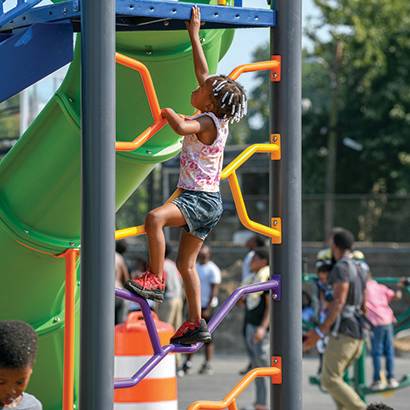
For an enhanced digital experience, read this story in the ezine.
Every year, the NRPA Research team surveys 1,000 U.S. adults to better understand how people connect with parks and recreation, the results from which serve as the basis for the NRPA Engagement with Parks Report. The 2020 report, which will be available in early September, provides key stakeholders with insights on the importance that local parks and recreation facilities have on the lives of every person in our nation.
This year, we conducted a shorter than typical Engagement with Parks survey because of the pandemic. The 2020 study focused on a few questions:
- How frequently do people visit parks, trails and recreation amenities?
- How has the pandemic affected park usage?
- Do U.S. adults see public parks as an essential government service?
- Are people more likely to vote for political leaders who support park and recreation funding?
The main takeaway from this year’s survey is that now, more than ever, parks and recreation is essential.
According to this past May’s Park Pulse poll, 83 percent of U.S. adults said that exercising at local parks, trails and open spaces was essential to maintaining mental and physical health during the pandemic. The Engagement with Parks survey results tell us this sentiment is not fleeting and reflect a passion for parks and recreation.
More than 4 in 5 U.S. adults say that parks and recreation is essential, a sentiment that holds for all segments of the population:
- Across generations: 86 percent of both millennials and Gen Xers and 82 percent of baby boomers
- Spanning race and ethnicities: 85 percent of people who identify as Hispanic/Latino, 84 percent who identify as white and 76 percent who identify as non-white
- For all household formation types: 88 percent of parents and 79 percent of nonparents
- Crossing the political spectrum: 86 percent of Republicans, 82 percent of Democrats and 80 percent of independents
Parks and recreation is essential because park usage is ubiquitous. The U.S. public visits a park or recreation facility more than twice a month on average. But for some people, parks are an even more regular habit with 1 in 6 survey respondents telling us that they visit park and recreation amenities at least weekly.
Park and recreation professionals have worked tirelessly to keep outdoor public spaces open and safe during the pandemic. Even at the peak of stay-at-home edicts, parks and trails largely remained open and served as the sole recreation opportunity available to the public. In turn, people flocked to these resources to maintain their physical and mental health through the crisis.
Fifty-nine percent of U.S. adults visited a park or recreation facility at least once from mid-March through mid-June. This translates to more than 190 million people in the United States whose lives were made better thanks to the hard work of park and recreation professionals during the first months of the pandemic.
The vital role parks and recreation plays in everyday life also translates into broad public support for political leaders who champion for greater agency funding. Seventy-two percent of U.S. adults indicate that they are more likely to vote for politicians who prioritize park and recreation funding.
Voters’ preference for local politicians who support park and recreation funding is robust across nearly every segment of the population:
- Generation: Millennials (76 percent) and Gen Xers (79 percent)
- Household formation: Parents (81 percent) and nonparents (67 percent)
- Political affiliation: Democrats (79 percent) and Republicans (75 percent)
- Residence: Walkable distance of a park (75 percent) and not a walkable distance of a park (64 percent)
The 2020 NRPA Engagement with Parks Report reinforces the message that parks and recreation is essential, and this sense transcends the pandemic. The public’s broad support for parks and recreation solidifies this critical message to local political leaders, funders and the general public that park and recreation professionals and their agencies deserve full funding support.
Kevin Roth is Vice President of Research, Evaluation and Technology at NRPA.

